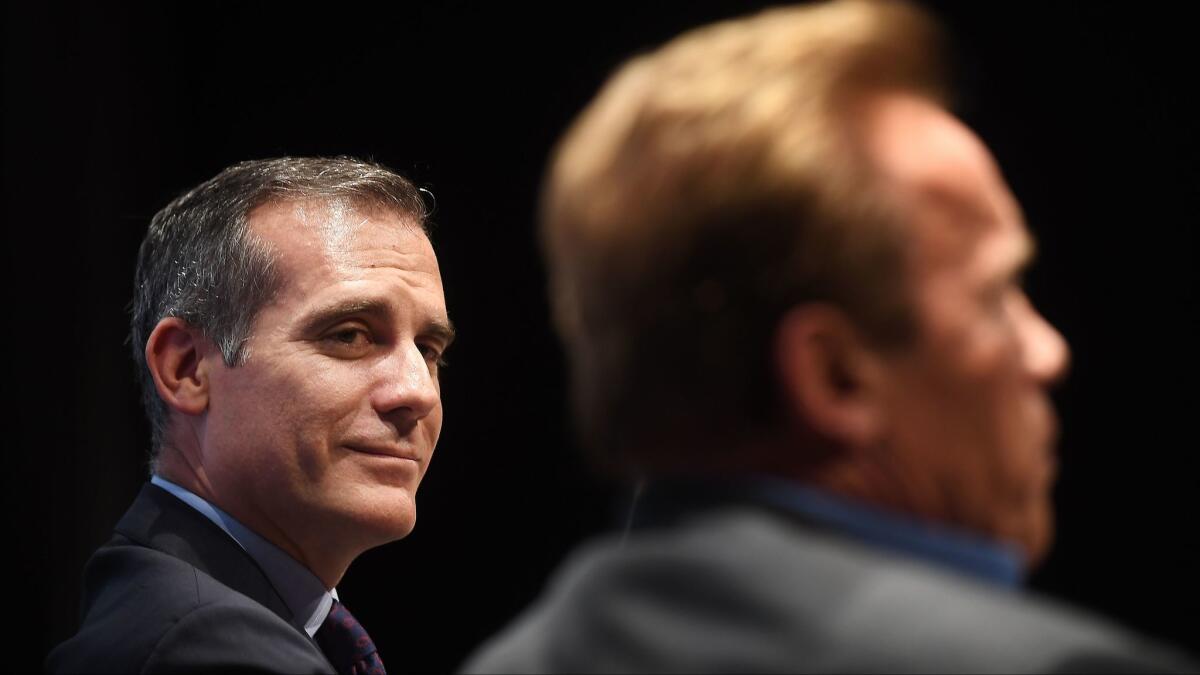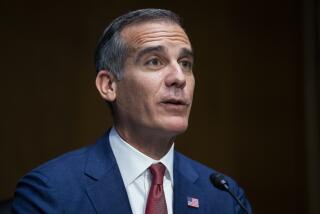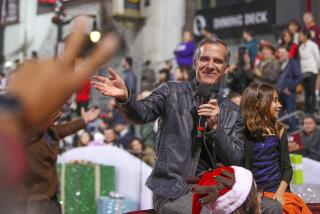Op-Ed: Would L.A.’s mayor make a good presidential candidate?

On Saturday, Eric Garcetti began his second term as mayor of Los Angeles, and everyone in the political world assumes he has his sights set higher. Problem is, a small army of his fellow Democrats are already running to succeed Jerry Brown as governor, and Dianne Feinstein may well seek reelection to the Senate next year. If she doesn’t, another gaggle of Democrats will vie to take her seat. Were Garcetti nonetheless to run for either of these offices, he would need to begin campaigning for that other job immediately, with his mayoral oath still hanging in the air.
Garcetti has another option: seeking the presidency in 2020. Although he told the Los Angeles Times editorial board on Thursday that he’s not running — not at this time — Politico reports that Garcetti is “already talking to strategists and big donors about the prospect.”
Should he succeed, that would shatter all precedents: No mayor has ever gone straight from a city hall to the White House. So, if Politico’s right that he’s discussing his prospects, what are they?
City Hall to White House is a leap, but so is ‘The Apprentice’ to the White House.
On the positive side, he’s clearly very bright (a Rhodes scholar), youngish (46), and can boast a record of accomplishment. Like his mayoral predecessor, Antonio Villaraigosa, he steered to passage a tax increase to fund massive rail construction across L.A., and championed another measure to address the city’s homelessness crisis. He signed a local minimum wage increase to $15, has staunchly defended L.A.’s immigrants and made clear that the LAPD will not cooperate with federal immigration officials as they seek to depopulate vast quadrants of the city. He won reelection with 81% of the vote.
Plus he’s Jewish, and Latino, and Italian. And plays a mean jazz piano.
And yet, some of the very qualities that have defined him and attuned him to his city are almost surely impediments to winning the presidency. At a moment when the cultural divide between big cities and the rest of the country has seldom yawned so wide, Garcetti’s identity and affect as the Complete Urbanite doesn’t seem likely to win back the resentful white Rustbelters of Wisconsin, Michigan and Pennsylvania who handed the White House to Donald Trump.
Nor has Garcetti demonstrated that he has what it takes to sound the anti-plutocratic notes that an increasing number of Democrats — Sens. Bernie Sanders and Elizabeth Warren supporters, for starters — want sounded. As Democratic pollster Stan Greenberg has argued, a sharp-edged populism — prosecuting miscreant bankers, opposing anti-worker trade deals, restoring free college educations, moving to Medicare for all, and driving big money from our political temples — is key to winning back not just white swing voters, but also boosting turnout among minorities and the young. Garcetti would particularly need to stress these themes if he’s to offset the obvious disadvantage he’d labor under with white working class voters for his defense of immigrant rights.
Both Democratic base voters and those swing white workers have been drawn to Sanders (and to a lesser degree, Warren) in no small part because they give voice to the deep and entirely justifiable wrath that most Americans feel towards the economic elites who’ve grown rich at their expense and the political elites who’ve passed the laws that let that happen. That kind of anger, and the progressive populism that flows from it, doesn’t seem to be part of Garcetti’s behavioral or political make-up. That would limit his appeal to both Democratic primary and general election voters.
The two current elected officials who strike me as most like Garcetti are French President Emmanuel Macron and New Jersey Democratic Sen. and former Newark Mayor Cory Booker — like Garcetti, wunderkinder who’ve climbed the political ladder with establishment support at every rung.
Like Macron, Garcetti won a resounding electoral victory this year but faced lackluster opponents and excited few voters. (Garcetti’s 81% margin was offset by L.A.’s sub-20% turnout.)
Like Booker, he’s an urbanite much loved by economic elites (in Booker’s case, Wall Street; in Garcetti’s, Hollywood; in both cases, tech) that inspire anything but love in much of the electorate. Booker is already waging a proto-campaign for the Democrats’ 2020 presidential nomination; should he establish himself as the hip middle-aged yuppie in the field, Garcetti would be hard pressed to find an open lane, particularly with someone in the Sanders-Warren wing (perhaps even Sanders or Warren) running to his left.
Still, if we’ve learned anything from 2016, it’s that the improbable sometimes happens. City Hall to White House is a leap, but so is “The Apprentice” to the White House. Stranger — and incalculably more dangerous — things have happened on the road to the presidency.
Harold Meyerson is executive editor of the American Prospect. He is a contributing writer to Opinion.
Follow the Opinion section on Twitter @latimesopinion or Facebook
More to Read
A cure for the common opinion
Get thought-provoking perspectives with our weekly newsletter.
You may occasionally receive promotional content from the Los Angeles Times.





